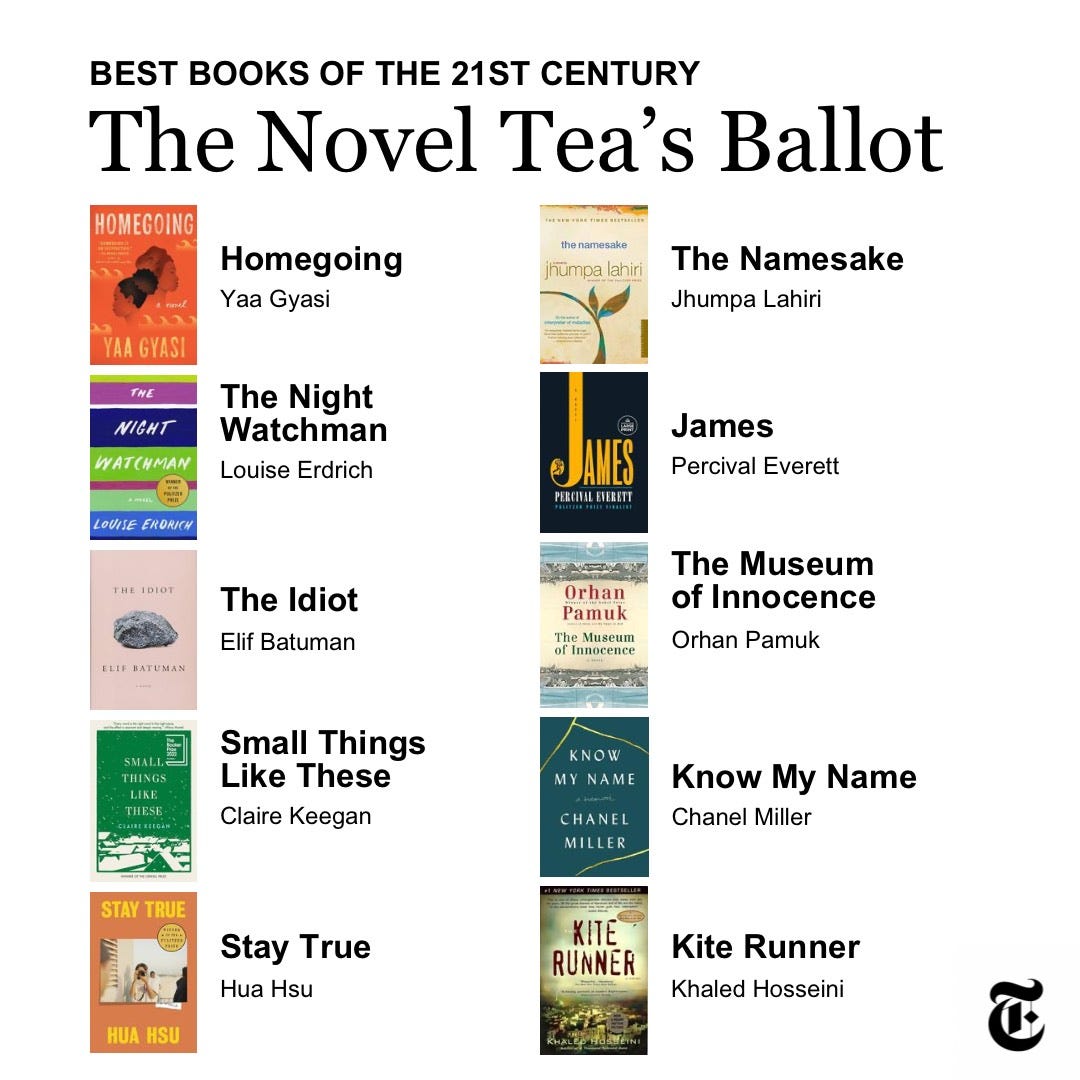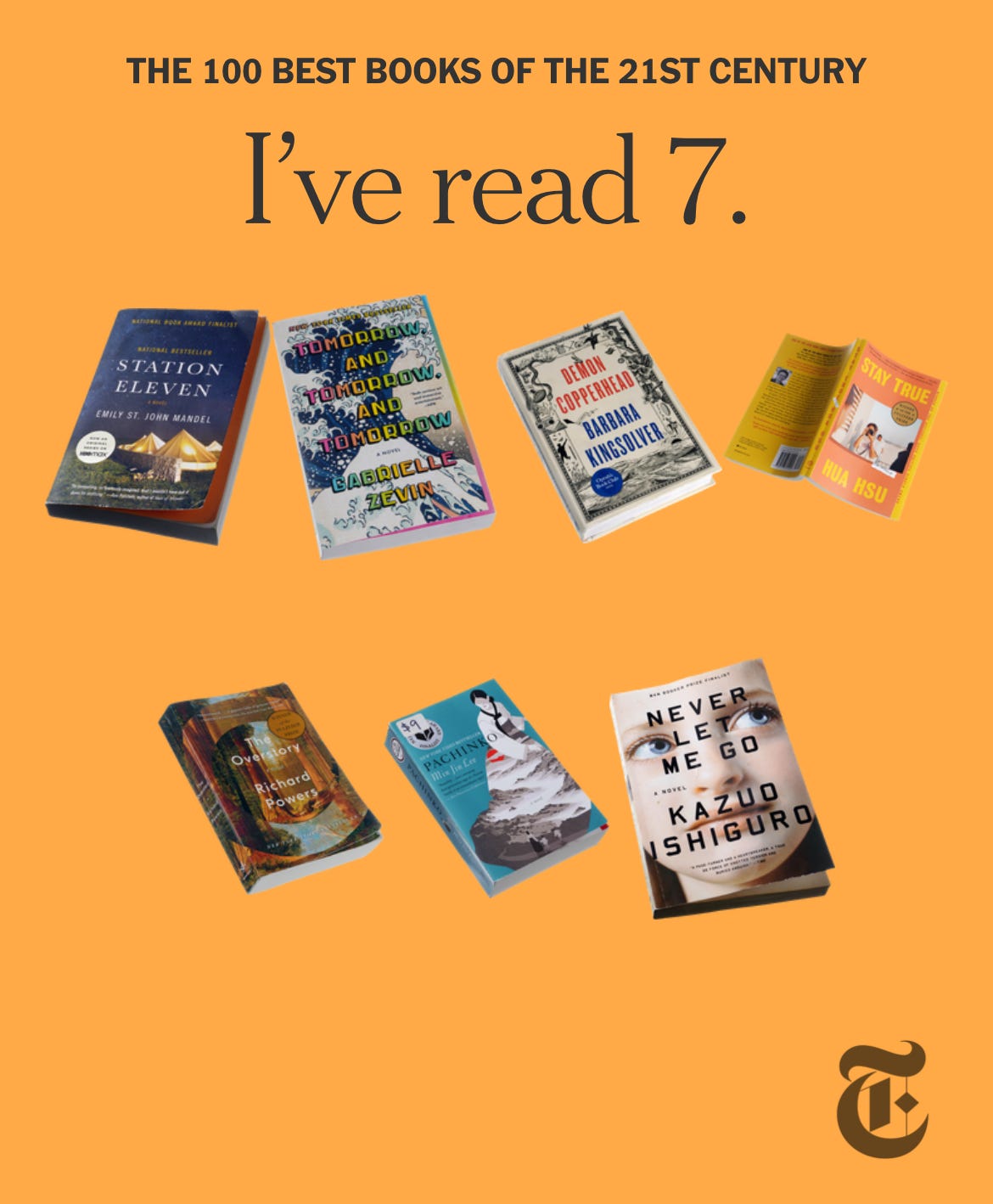The Best Books of the 21st Century and a Special Announcement
Thoughts on the NYT list, our own version, and announcing paid subscriptions
This week, The New York Times created buzz in the book world by publishing their list of the 100 best books of the 21st century so far. They released 20 books each day, starting with the bottom, and working their way up to top 20 — it was gimmicky, but we liked the gimmick. Fellow writers and Bookstagrammers have been sharing their top 10s, and we couldn’t help but add ours, as well as share some of our thoughts on the NYT’s official list.
But first — we have an exciting announcement. We will now be offering a paid subscription option for our newsletter. We have been so encouraged by the support we have found on this platform, and we are excited to take this next step!
Importantly: all subscribers, whether free or paid, will continue to get weekly newsletters from us on Tuesdays.
For paid subscribers, as a token of our appreciation, we will be providing personalized book recommendations on request — you can find the link on our main page (or just email us if you can’t find it!). There will also be occasional bonus Saturday newsletters for paid subscribers like this one.
Paid subscriptions will help us continue our work on the podcast (which is free to all and has no ads), write high-quality and well-researched newsletters, and will enable us to expand into things like merchandise, giveaways, and more!
If you have already pledged any amount, you will still receive an email asking whether you would like to upgrade your subscription.
Okay, now that business is taken care of — on to the book lists!
The Novel Tea’s Top 10 Books of the 21st Century
Below is our combined list, in no particular order. In making this list, we tried to identify books that had global appeal, contained strong ideas or emotions, were well-written, and could stand the test of time. We each made our own top 10 list and then worked to merge it together.
Neha’s Thoughts on the NYT List
I think it’s important that you know that I am a huge “list” person. Whether it’s a curated list from a random influencer on Instagram about the best non-see-through white tees to buy or my own daily to-do list, I will eat it up every time. However, I wasn’t alone in this excitement over the NYT Best Books of the 21st Century list. I was seeing people everywhere post their tallies and opinions, and as the days passed and all 100 books were announced… my tally looked like this:
This left me feeling sad, insufficient, and confused. Many books on the list have been on my TBR for a long time; some of them I had never heard of, and others I had read different books from the same author. This got me thinking; should I have picked a different book by that author? Did I make the wrong choice about my next read from my TBR because it wasn’t on this list? Clearly, I have my work cut out for me to read the other 93 books, so I don’t feel like I am missing out… right?
I realized that I was taking this NYT catalog the wrong way. Some of my favorite books were published before the 2000s. I love living in fantasy worlds and delving into Westeros, Arrakis, or Hogwarts (not many high fantasy options made it on the NYT list). I also spend almost every fall and winter re-reading my favorite books of all time, so although I always have a book in my hand, my variety and span of books may not be very diverse.
This inventory of books isn’t meant to show how successful I am as a reader —if anything, it’s a new TBR for me and I am excited about getting into these new reads whether that is tomorrow or in another 25 years.
Shruti and I had fun discussing books that were published this century that hold value to us. It wasn’t as easy as making a list of our favorite books that just happened to be published post-1999, but a more thoughtful analysis of which books we think have a worldly impact and deserve to be showcased for their message, storytelling, writing, and timelessness.
Shruti’s Thoughts on the NYT List
Before I talk about the NYT list, I wanted to share some thoughts on making my own top ten: the worst part about trying to create one of these lists is that I know I have not read the best 10 books of the 21st century; so in a way, I have lost before I’ve even started.
I also realized that most of my favorite books, and the ones I think are most deserving of accolades (two descriptions that often overlap, but not always) were published decades — nay, centuries — ago. Worse still, several favorites were published in the 90s, missing the cutoff by just a few sad years. Apparently, I put high importance on books standing the test of time.
Some books that I loved but didn’t make the cut: Harry Potter (which book do I choose? And was any one book spectacular, or was it the amalgamation of all seven, the movies, the fanfiction, the theme parks, etc, that made it so meaningful?); Birnam Wood (excellent but I couldn’t quite articulate whether its content was meaningful, or if it was just a really good story); and The Hunger Games (incredibly rich in ideas, but the writing wasn’t on par with the other contenders, and again, we felt strange about including just one book of a series).
Let us know what criteria you used in creating your own list!
And now, my thoughts on the NYT list — for context, I’ve read 20 out of the 100 on their list.
Here’s a tally of the types of books they included:
66 novels
7 short story collections
15 non-fiction books
2 essay collections
10 memoirs
There was more non-fiction than I was expecting (>25%), which partly comes down to personal preference — but it also strikes me as strange because I see fiction and non-fiction as so completely different from each other that putting them in the running together, just because they are packaged in the same form, feels wrong.
There were 13 translated books, as follows: 3 Italian (all Ferrante), 4 Spanish, 1 Nynorsk (Norwegian), 1 Russian, 1 Danish, 1 Korean, 1 French, and 1 German. It started to feel to me like the same kind of ignorance that the Oscars engages in, in which nearly all foreign film nominations seem to come from European countries1 — while I definitely have room to improve in my own reading diversity, I do wish the official list, a composite of multiple opinions and subject to editorial review, was more expansive in its breadth.
And when I talk about diversity, I don’t just mean country of origin or language — I counted only five genre fiction books in the whole list: Station Eleven, Life after Life, The Fifth Season, Cloud Atlas, and Never Let Me Go. Of these, I think I would only really call The Fifth Season true genre fiction — the others are just lightly speculative.
As the days counted down to the top twenty being released yesterday, I grew more and more excited, even though — let’s face it — this list has no real bearing on my life, and I haven’t even heard of most of the authors who contributed. I was quite surprised to see that My Brilliant Friend bagged the #1 spot; while I thought the setting and subject matter were compelling, the story dragged for me, and I struggled with the pacing.
Even more upsetting was the fact that somehow George Saunders and Elena Ferrante had three books each (not a personal dig against either of these authors, but 3 books out of 100 is a lot), while Jhumpa Lahiri, Louise Erdrich, Orhan Pamuk, and Margaret Atwood didn’t even have one.
I am also tired of seeing writers’ lists. Every time a publication releases their list of “top books” the contributors seem to primarily be other authors. I have nothing against this list in particular, and I am glad it is out in the world (so much fun discussion!) but I would love to just see more lists by ordinary readers.2
I’m not that mad about the list, I promise, even if it sounds like I am — but why did this list seem so weirdly sheltered, bland, and, for lack of a better descriptor, white?3 Am I the only one who thinks this? Am I overreacting? Let me know!
Imperialism is well and alive, friends.
I can’t wait to see the NYT crowdsourced list, and compare it to the writers’ list.
And by this I don’t mean that the authors were white, but that somehow, it felt to me that the people picking these books were choosing through a very white, affluent lens; does this make sense? I’m not sure.







Homegoing, The Namesake, and Know My Name made my list too. I was shocked the Namesake and Know My Name didn’t make the official list!
I've been thinking and reading so much about this list and i think it all comes down to who they asked to participate and their own personal conditioning/bias as probably Americans where affluent white culture dominates. And also their age!! Like how old was everyone, because I know for a fact if you asked a bunch of 20-somethings Rooney would have at least two of those spots. I would LOVE for them to do this exercise again every 10 years, what a change we would see!!